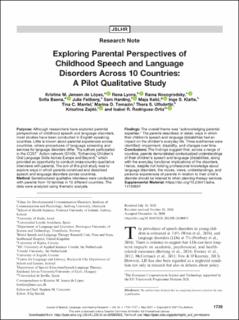| dc.contributor.author | Jensen de López, Kristine M. | |
| dc.contributor.author | Lyons, Rena | |
| dc.contributor.author | Novogrodsky, Rama | |
| dc.contributor.author | Baena, Sofia | |
| dc.contributor.author | Feilberg, Julie | |
| dc.contributor.author | Harding, Sam | |
| dc.contributor.author | Kelić, Maja | |
| dc.contributor.author | Klatte, Inge S. | |
| dc.contributor.author | Mantel, Tina C. | |
| dc.contributor.author | Tomazin, Marina O. | |
| dc.contributor.author | Ulfsdottir, Thora S. | |
| dc.contributor.author | Zajdó, Krisztina | |
| dc.contributor.author | Rodriguez-Ortiz, Isabel R. | |
| dc.date.accessioned | 2022-05-12T14:42:46Z | |
| dc.date.available | 2022-05-12T14:42:46Z | |
| dc.date.created | 2021-12-08T10:08:58Z | |
| dc.date.issued | 2021 | |
| dc.identifier.citation | Journal of Speech, Language and Hearing Research. 2021, 64 (5), 1739-1747. | en_US |
| dc.identifier.issn | 1092-4388 | |
| dc.identifier.uri | https://hdl.handle.net/11250/2995503 | |
| dc.description.abstract | Purpose
Although researchers have explored parental perspectives of childhood speech and language disorders, most studies have been conducted in English-speaking countries. Little is known about parental experiences across countries, where procedures of language screening and services for language disorders differ. The authors participated in the COST1 Action network IS1406, “Enhancing Children's Oral Language Skills Across Europe and Beyond,” which provided an opportunity to conduct cross-country qualitative interviews with parents. The aim of this pilot study was to explore ways in which parents construed and described speech and language disorders across countries.
Method
Semistructured qualitative interviews were conducted with parents from 10 families in 10 different countries. The data were analyzed using thematic analysis.
Findings
The overall theme was “acknowledging parental expertise.” The parents described, in detail, ways in which their children's speech and language (dis)abilities had an impact on the children's everyday life. Three subthemes were identified: impairment, disability, and changes over time.
Conclusions
The findings suggest that, across a range of countries, parents demonstrated contextualized understandings of their children's speech and language (dis)abilities, along with the everyday functional implications of the disorders. Hence, despite not holding professional knowledge about language disorders, the voices, views, understandings, and personal experiences of parents in relation to their child's disorder should be listened to when planning therapy services. | en_US |
| dc.language.iso | eng | en_US |
| dc.publisher | American Speech-Language-Hearing Association | en_US |
| dc.rights | Navngivelse 4.0 Internasjonal | * |
| dc.rights.uri | http://creativecommons.org/licenses/by/4.0/deed.no | * |
| dc.title | Exploring parental perspectives of childhood speech and language disorders across 10 countries: A pilot qualitative study | en_US |
| dc.title.alternative | Exploring parental perspectives of childhood speech and language disorders across 10 countries: A pilot qualitative study | en_US |
| dc.type | Peer reviewed | en_US |
| dc.type | Journal article | en_US |
| dc.description.version | publishedVersion | en_US |
| dc.source.pagenumber | 1739-1747 | en_US |
| dc.source.volume | 64 | en_US |
| dc.source.journal | Journal of Speech, Language and Hearing Research | en_US |
| dc.source.issue | 5 | en_US |
| dc.identifier.doi | 10.1044/2020_JSLHR-20-00415 | |
| dc.identifier.cristin | 1965980 | |
| cristin.ispublished | true | |
| cristin.fulltext | original | |
| cristin.qualitycode | 2 | |

